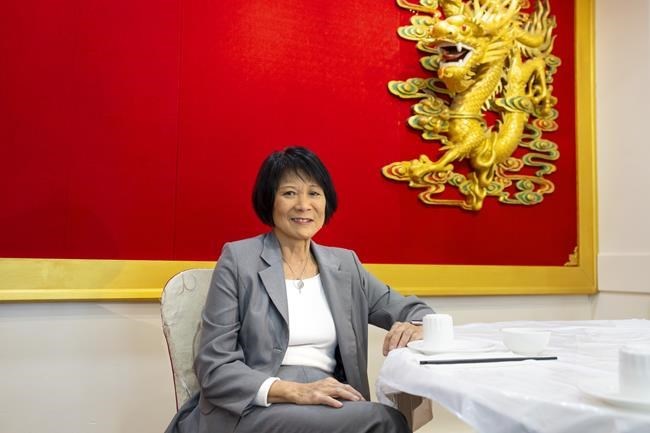TORONTO — Olivia Chow is running to be the next mayor of Toronto, marking a return to electoral politics for the longtime city councillor and NDP parliamentarian.
Chow announced her bid for the mayor's chair on Monday, adding a highly recognizable name to the long list of candidates running in the byelection set for June 26.
Toronto has become more expensive and less livable, Chow said, explaining that she was running to build a safe, affordable and caring city.
"Life is getting harder. Toronto is still a great city, but not for everyone," she said, speaking on the terrace of a Chinatown restaurant overlooking downtown Toronto. "We urgently need to build a city that cares."
Chow will be seeking to reverse her fortunes after coming a distant third in the 2014 mayoral race behind runner-up Doug Ford, who is now Ontario's premier, and John Tory, who was elected to three terms. Tory resigned in February after admitting to an affair with a staff member.
When asked what made this mayoral bid different from her 2014 campaign, Chow said she had learned "a lot of lessons."
"The key one was that it’s OK if my English is not perfect,” said Chow, who immigrated to Toronto from Hong Kong at 13 years old. "I can trust the decades of experience that I have. I will do fine. I can be more genuine and authentic by just speaking what I have in my mind."
Chow's long-speculated, but delayed entry into the race will see her look to gain ground on byelection contenders who have been openly campaigning since the nomination period opened two weeks ago.
It wasn’t an easy decision to re-enter the political fray, Chow said, after spending the last several years leading the Toronto-based charity she founded, the Institute for Change Leaders, which runs training programs for social movement organizers.
"I also have to take a leave of absence from an organization that I love a lot and I've committed to doing these trainings, especially for people that are really involved in housing. And I needed to make sure that things could continue,” she said, when asked why she had waited to announce her candidacy.
Chow immediately becomes one of the most recognizable names in a crowded field that includes Coun. Josh Matlow and Coun. Brad Bradford, ex-police chief Mark Saunders, former deputy mayor Ana Bailão and former provincial education minister Mitzie Hunter.
Chow’s announcement did not include any specific platform policies, pledging to release more details in the coming days.
In response to questions, she stated her opposition to so-called "strong mayor" powers, which allow the mayor to pass a budget with only one-third council support, and the proposed provincial plans to turn part of Ontario Place into a spa.
She also said it "doesn't make sense" to move the Ontario Science Centre from its current location in east Toronto to the Ontario Place site, which Ford has hinted at.
Chow has longstanding ties to the New Democratic Party, having served as the NDP MP for Trinity-Spadina in the House of Commons alongside her late husband and former party leader Jack Layton.
Her mayoral campaign is being directed by Michal Hay, who ran federal NDP Leader Jagmeet Singh’s leadership bid and who was the founding executive director of Progress Toronto, a non-profit advocacy group that works to elect progressive candidates to city hall.
While Chow's announcement sidestepped party affiliation, the NDP's network will likely be able to help her raise money and recruit volunteers, said political scientist Myer Siemiatycki.
The other high-profile campaigns are managed by staffers with ties to Liberal and Conservative politics.
Chow's foray represents a major shakeup for the mayoral race, likely to cut into support for Matlow and Hunter -- the progressive candidates most aligned with Chow's messaging, Siemiatycki said.
Vote splitting will be challenge for everyone in the crowded field -- with at least nine contenders who have held elected office and 48 registered candidates as of Monday, said Siemiatycki.
If Chow can repeat her 2014 election results, when she finished third after earning about 23 per cent of the popular vote, that could be enough to win this byelection, he said.
"Each and every (candidate) has the challenge of rising above the field and developing a distinct, coherent messaging and spotlight onto themselves," said Siemiatycki, professor emeritus of politics at Toronto Metropolitan University.
Despite her NDP ties, Chow looked to court voters from across the ideological spectrum, referring on Monday to what she called her experience of working across the political aisle.
She repeatedly cited her efforts to ensure 911 service was provided in over 200 languages and to expand child nutrition programs.
"Whether you're left, right, centre – doesn't matter. Let's come together," she said.
Siemiatycki, the political scientist, said he expected the campaign would get lively, and potentially "nastier, as candidates looked to differentiate themselves from the field.
Shortly after her announcement, the Saunders campaign issued a statement accusing Chow of being another "status quo" politician. Bailão campaign staffers lingered outside the restaurant where Chow made her announcement, handing out material highlighting the endorsements Bailão received from four union locals.
This report from The Canadian Press was first published April 17, 2023.
Jordan Omstead, The Canadian Press

